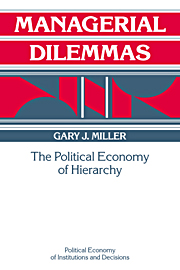Book contents
- Frontmatter
- Contents
- List of tables and figures
- Series editors' preface
- Acknowledgments
- Introduction
- PART I WHY HAVE HIERARCHY?
- PART II MANAGERIAL DILEMMAS
- 4 Horizontal dilemmas: Social choice in a decentralized hierarchy
- 5 Vertical dilemmas: Piece-rate incentives and credible commitments
- 6 Hidden action in hierarchies: Principals, agents, and teams
- 7 Hidden information in hierarchies: The logical limits of mechanism design
- 8 Hierarchical failures and market solutions: Can competition create efficient incentives for hierarchy?
- PART III COOPERATION AND LEADERSHIP
- Epilogue: Politics, rationality, and efficiency
- References
- Name Index
- Subject Index
5 - Vertical dilemmas: Piece-rate incentives and credible commitments
Published online by Cambridge University Press: 05 June 2012
- Frontmatter
- Contents
- List of tables and figures
- Series editors' preface
- Acknowledgments
- Introduction
- PART I WHY HAVE HIERARCHY?
- PART II MANAGERIAL DILEMMAS
- 4 Horizontal dilemmas: Social choice in a decentralized hierarchy
- 5 Vertical dilemmas: Piece-rate incentives and credible commitments
- 6 Hidden action in hierarchies: Principals, agents, and teams
- 7 Hidden information in hierarchies: The logical limits of mechanism design
- 8 Hierarchical failures and market solutions: Can competition create efficient incentives for hierarchy?
- PART III COOPERATION AND LEADERSHIP
- Epilogue: Politics, rationality, and efficiency
- References
- Name Index
- Subject Index
Summary
The important result is the moderate level of reward and compliance in equilibrium, even though both individuals would be better off with a high degree of reward and a high degree of compliance. The Pareto optimal result is not achieved because both superior and subordinate have an incentive to break away from it. The supervisors quite naturally have an incentive to give less than the maximum reward to the subordinates, and the subordinates quite naturally have an incentive to float through their work situation with less than 100 percent effort.
Miller (1977: 50)While it is necessary to delegate authority to individuals with specialized knowledge, that very delegation opens the door to incoherent organizational action. What is needed, therefore, is an incentive system that will encourage organizational specialists to use their knowledge in the coherent pursuit of organizational goals. An ideal incentive system will overcome information asymmetries and team production externalities, transforming an organizational social dilemma into an organizational “invisible hand.” An incentive system should harness individual self-interest in pursuit of organizational goals.
Most hierarchies make little attempt to use their compensation systems to overcome the temptation of team members to shirk. Only 22 percent of U.S. workers feel that there is a direct connection between their effort and how much they are paid, despite the fact that 61 percent want their pay to be tied to their performance (Lawler 1987: 69–76).
- Type
- Chapter
- Information
- Managerial DilemmasThe Political Economy of Hierarchy, pp. 102 - 119Publisher: Cambridge University PressPrint publication year: 1992



